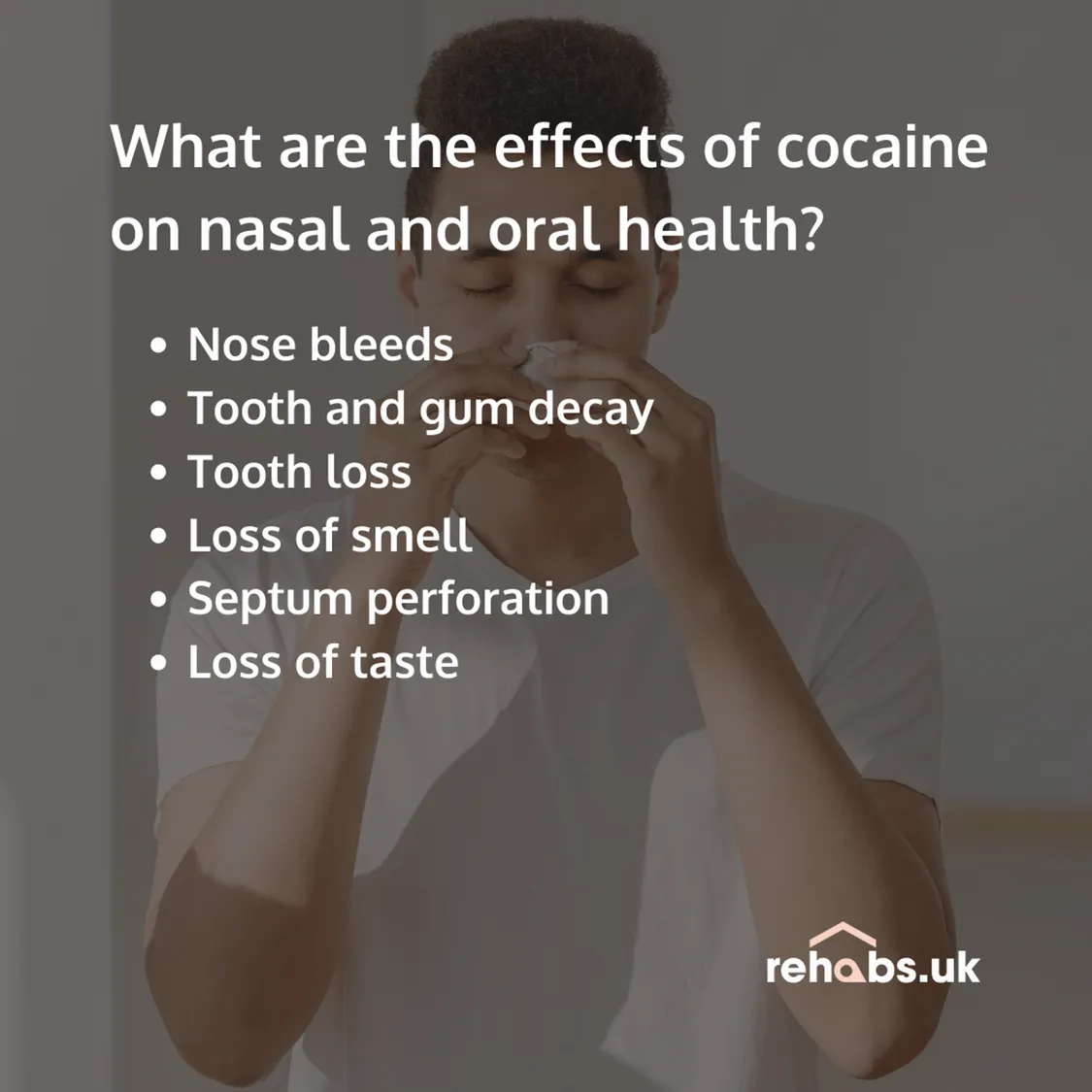05 Oct 2023
The Effects of Cocaine on Nasal and Oral Health
Cocaine, a potent stimulant drug derived from the coca plant, is notorious for its harmful effects on physical and mental health. While it is commonly associated with its addictive nature and detrimental impact on the central nervous system, it's essential to understand the specific repercussions it has on nasal and oral health. In this article, we'll explore the short-term and long-term effects of cocaine on these areas and provide information on how to seek help for cocaine addiction.
The Short-Term Effects of Cocaine on Nasal and Oral Health
Cocaine use leads to various short-term effects on nasal and oral health, both of which can be categorised into acute and chronic consequences. In most of the Western world including the UK, cocaine is an extremely popular drug, one which many use in combination with alcohol. According to the British Dental journal, almost one million people in the UK use cocaine on a regular basis (and increasing). For some, it has become so normalised within drinking and social culture, as well as in a lot of high-intensity work environments such as sales, that it may be presented as not such a harmful substance. It's crucial to be aware of these immediate effects to make informed decisions regarding drug use.
Nasal
Nasal Congestion
One of the most common short-term effects of cocaine use is nasal congestion. Cocaine is often snorted through the nose, and the drug's vasoconstrictive properties lead to the narrowing of blood vessels in the nasal passages. This constriction can result in reduced blood flow, leading to congestion, difficulty breathing, and even nosebleeds.
Damage to Nasal Tissues
Cocaine is corrosive and can cause significant damage to the delicate tissues inside the nasal passages. Frequent use may lead to inflammation, ulcers, and erosion of the nasal septum—the cartilage that separates the nostrils.
Oral
Gum and Tooth Problems
Cocaine can have detrimental effects on oral health, including gum and tooth problems. The drug can reduce saliva production, leading to dry mouth, which, in turn, increases the risk of tooth decay and gum disease. Additionally, grinding or clenching teeth, a common side effect of cocaine use, can cause dental damage.
Oral Lesions
Cocaine users may develop oral lesions, such as painful sores or blisters, as a result of the drug's corrosive properties. These lesions can make eating and speaking uncomfortable and can lead to more severe oral health issues if cocaine use persists.

The Long-Term Effects of Cocaine on Nasal and Oral Health
Understanding the long-term effects of cocaine on nasal and oral health is equally important as it sheds light on the potential consequences of prolonged drug use.
Nasal
Perforation of the Nasal Septum
Continued cocaine use can lead to the perforation of the nasal septum, causing a hole or opening between the nostrils. This condition is not only physically uncomfortable but can also affect a person's ability to breathe properly. In this case you should seek help from a healthcare provider as nasal surgery may be required to rebuild the structure of the nose.
Chronic Nasal Infections
Chronic cocaine use weakens the immune system's ability to fight infections, making users more susceptible to nasal infections. These infections can further exacerbate nasal damage and discomfort. Similarly, if an infection occurs, contact a healthcare provider as antibiotic cream or medicine may be needed.
Oral
Tooth Decay and Tooth Loss
Long-term cocaine use often results in severe tooth decay, gum disease, and, in extreme cases, tooth loss. The combination of dry mouth, poor oral hygiene, and dental grinding takes a significant toll on oral health.
Oral Cancer
Prolonged cocaine use has been associated with an increased risk of oral cancer. The corrosive nature of the drug can damage oral tissues, potentially leading to the development of cancerous lesions.
How Long Do the Effects of Cocaine Use Last?
The duration of the effects of cocaine use on nasal and oral health can vary from person to person and depends on factors such as the frequency and quantity of drug use, overall health, and lifestyle. In general, acute effects may last for a few hours to a couple of days, while chronic effects can be long-lasting or even permanent. The use of cocaine can also effect other parts of the body such as heart health as well as causing sleeping issues.
How to Get Help with Cocaine Addiction
If you or someone you know is struggling with cocaine addiction, it's important to seek help as soon as possible. Rehabs UK offers comprehensive addiction treatment services from residential rehab to outpatient programmes, including detoxification, therapy, and support to help individuals overcome their addiction and regain their health.
Take the first step towards recovery by contacting us today. Our compassionate and experienced team is ready to assist you on your journey to a healthier, drug-free life. Fill out our contact form to get in touch or give us a call and start your path to recovery.
In conclusion, the effects of cocaine on nasal and oral health can be severe, both in the short-term and long-term. Understanding these consequences is essential for making informed choices regarding drug use, and seeking help for addiction is the first step towards recovery and improved overall health.
